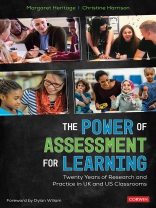The future of Assessment for Learning 20 years after Inside the Black Box
Twenty years after the publication of Inside the Black Box, the landmark review of formative classroom assessment, international education experts Christine Harrison and Margaret Heritage tackle assessment for learning (Af L) anew, with fresh insights gained from two decades of research, theory, and classroom practice.
The Power of Assessment for Learning: Twenty Years of Research and Practice in UK & US Classrooms examines the practices and processes of formative assessment over time in both countries, evaluates the benefits accrued to teaching and learning, and considers future developments in growing and sustaining Af L practice. It features:
- Key Af L ideas, approaches, and supports
- Vignettes of classroom practice that illustrate Af L in action in the U.K. and U.S.
- Practice-based evidence to enrich understanding of Af L from both the teacher’s and the student’s perspective
Focused on student-centeredness and rich with classroom examples, this book is a ‘sounding board’ for educators to explore and reflect on their own Af L practices and beliefs.
Inhoudsopgave
Foreword by Dylan Wiliam
Preface
Acknowledgments
About the Authors
Chapter 1 Inside the Black Box Revisited
A New Way of Thinking About Assessment
A Systematic Review
What Is the Black Box?
Getting Into the Details
Is There Evidence That Improving Formative Assessment (Af L) Improves Standards?
Is There Evidence That There Is Room for Improvement?
Is There Evidence About How to Improve Formative Assessment (Af L)?
Changing Practice
Guiding Principles
Improvement as a Journey
Chapter 2 A Tale of Two Countries
The Tale of the United Kingdom
Major Policy Moves in the UK
A Tale From the US
Two Countries, Two Journeys?
Chapter 3 Student Role in Assessment for Learning
Expanding Conceptions of Af L
Sociocultural Perspective and Af L
Self-Regulated Learning
Growth Mindsets
Chapter 4 Planning for Learning
Distinct Teaching Approaches
Influences on Changing Practice
Concluding Thoughts
Chapter 5 Transforming Classrooms
Transforming Practice
Developing Af L Practices
Classroom Routines
Chapter 6 What Still Needs to Be Explored
From Evidence-Based Practice to Practice-Based Evidence
Teachers Need to Be Vigilant for Evidence
Interactions Work in a Nuanced and Detailed Way
Context Matters
Learning Identity
Identity-Safe Environments
Funds of Knowledge
Disciplinary Knowledge
Index
Over de auteur
Christine Harrison is a Professor in Science Education at King’s College London, where she works as a researcher and teacher educator. Chris’s career began in schools and developed through curriculum development projects and examining in the U.K. before she began working on her own research. Working at a prestigious university, and also spending considerable time in classrooms on research and supporting pre-service teachers, Chris began to realize that there was a gap between research ideas and practice. To that end, she has worked with many teachers, researchers and organizations helping all learn from practice-based evidence so they can understand how practice across a variety of contexts centers around the principles of the research. Her work is published in peer-reviewed journals, edited books, and practitioner journals, and she has produced several on-line courses for teachers and researchers. Chris is Associate Director (London) for the Centre for Innovation in Teacher Education and Development, w a joint institutional strategic initiative between Teachers College, Columbia University and King’s College London, committed to the principles of equity and social justice. She is also a leading STEM educationalist in Europe working at research, practice and policy level.












